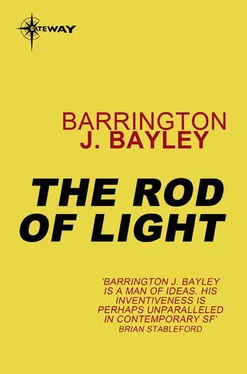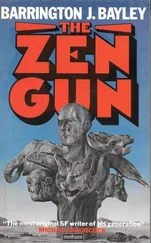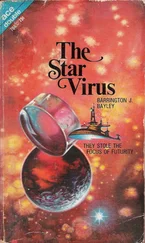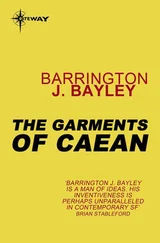Peeping from his shallow coal grave, Jasperodus had passed roads, fields, buildings, small towns, until after two days of slow but steady progress, the wagon train had stopped in a marshalling yard somewhere in the suburbs of a city.
There it was left standing, waiting, Jasperodus guessed, for re-routing to its final destination. For several hours he lay listening to the busy noises of the yard, the rolling of wheels, the clank of couplings, the drone and chuff of engines. In the New Empire, he reminded himself, he had been accustomed to thinking of this as an enemy city, a sentiment that still lingered. Now he experienced what many others before him had experienced on such occasions: vague surprise to see that the enemy lived, worked and organised just as one’s own people did.
He waited until about midnight. Then, though the yard was just as busy as before, he clambered down from the wagon and made his way across the labyrinth of tracks, keeping to the shadows where he could, to where he could climb an embankment.
At the top was a prickle-wire fence. After a glance around to make sure he was not observed, he snapped some of the wires and eased himself through.
He was in a narrow gap between the fence and blank-walled grey buildings that lined the top of the embankment. Walking along it until he could turn into an alley, he found himself in a maze of dark passages. The buildings, it would seem, were warehouses.
At length he was able to make his way out and came to open wasteground. Pressing forward towards where he guessed the centre of the city lay, he crossed a park of coarse grass, and came to a river.
It was a broad, slow-moving waterway, hemmed in by concrete walls. On the other side dark, looming shapes rose. That would be the less industrialised half of the city, he thought. Large conurbations tended to allocate their functions to either side of a river.
Studying the turbid water, he spotted some steps in the concrete. He moved to them and descended to a small stone jetty. The river was shallow: here was a chance to clean himself. He lowered himself into the water, found the bed muddy but firm, stepped out until the surface closed over his head and let the current slowly wash away the grains of slack, the dried mud and dust and grime of months.
An idea occurred to him. He was not sure what sort of reception a robot would get on the streets of a Borgor city, though as far as he knew it would simply be ignored—for a while, at least. The river might be a good place for him to hide, emerging only when he thought it was safe, until he became acquainted with his surroundings and decided on a plan of action. His body was sealed against water; he could stay submerged indefinitely.
With this thought in mind, he set off across the river bed, picking his way through tangles of scrap metal embedded in the mud, swaying in the current, towards the far bank.
The morning was far advanced, about ten days later, when Jasperodus left a ruined shed on the waterfront, partially screened by the embankment’s overhang, and walked to the nearby thoroughfares.
He had early on abandoned his water refuge for the scarcely less cheery shelter on the mud flat. His brief forays, usually in the early hours of the morning, had reconnoitred the city centre and gained some information, mainly from news-sheets picked out of waste bins.
He was in luck: the city was Breshk, Borgor’s capital. The river, called the Novyob, emptied into one of the artificial seas. Here was the government, the headquarters of the military (though the two were identical) and so forth.
He had racked his brains to think of some indirect way to gain the attention of Borgor’s leaders, but without avail. Finally, the question of time had begun to torment him. It was now getting on for a year since he had left Gargan.
What progress might the cult have made in that time?
Therefore he had decided to delay no longer, but to take the only course that immediately occurred to him.
The architecture of Breshk differed markedly from that of Tansiann. Borgor city buildings were grey, cubical blocks for the most part, surmounted by incongruously colourful domes which often had peculiar tapering curves. The dress and manners of the people, too, were foreign to him. The fashion was for ankle-length fur-trimmed coats worn by both men and women, and universally-worn conical fur-lined hats. In conduct, the inhabitants showed none of the acerbic self-assertiveness typical of the south. They were reserved, formal, and respected some rank order whose visible badges were not immediately evident to Jasperodus, stepping off pavements at the approach of a social superior, or instantly doffing headgear if spoken to by one. Yet there appeared to be no open disdain or arrogant lordliness among those of higher rank. There was, rather, a common recognition of one’s place in society.
Street traffic was surprisingly light. A rail-mounted public transport system—an institution practically unheard of in Tansiann—served the needs of the general populace. The private carriages that roamed the mainly unpaved roads were restricted by law to the ruling class.
From what Jasperodus had heard while on the planning staff in Tansiann (though knowledge of Borgor society had been astonishingly meagre in the New Empire) the social order here was based on an ancient political dictum that had even played a part in the philosophy of Tergov: To each according to his need, from each according to his ability . It was the perfect principle on which to found an ordered, stratified society. The cultivated needs of the educated upper classes went far beyond those felt by the relatively rude working population, while the latter had the manual ability to serve those needs.
To walk as a robot in broad daylight in the streets of Breshk was unnerving. People stopped and stared as he passed. Children followed him, though keeping their distance. But no one barred his path; no uniformed lawkeeper stopped him to ask his business. It was presumed that, like one of the electric omnibuses that rattled and sparked along the badly-laid rails, he was a machine with a task allotted by the government.
He walked the length of Neszche Prospect until coming to a building that was larger and more prominent than the others, that protruded, in fact, into the roadway, narrowing the street at that point. It was the War Ministry. Typically, there was no guard at the entrance. Jasperodus passed straight through into the small foyer, whose walls were decorated with enlarged pictures of Borgor military and civic dignitaries. He approached the female secretary sitting behind a reception desk.
‘I have to speak to Commissary Chief Marshal Mexgerad,’ he said. ‘I carry important information for him.’
The woman was middle-aged, and practised at her occupation. Just the same she stared at him in startlement. It was quite probable that she had never been addressed by a construct before.
She was also physically afraid. He could sense the revulsion she felt for him.
‘Give me this information,’ she said crisply when she recovered herself. ‘I will pass it on.’
‘It is for Commissary Chief Marshal Mexgerad alone. I must see him personally.’
She became flustered. ‘Ch-chief Marshal Mexgerad died five years ago,’ she stuttered. ‘Who sent you?’
‘Then his successor. Whoever is Commissary Chief Marshal at present.’
He detected a movement of her right leg. She was pressing a button on the floor.
Instantly, with a terrifying bang, steel shield-walls fell into place from the ceiling, cutting off the desk, the street entrance, and the other exit at the end of the foyer. He was imprisoned, in what turned out to be no more than a plush, moderately sized cell.
He waited, and after about a minute a hidden panel in the wall snicked open. Three figures in bulky white armour emerged, with great caution, the projecting snouts of their gas masks making them look like padding polar bears. They aimed large tube-like weapons at him: beamers, effective against robots.
Читать дальше












